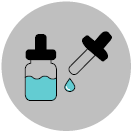DID YOU KNOW?
More than 50% of Maine homeowners have a private well, but less than half have been tested for harmful contaminants.
The most common health concerns with well water is the potential presence of arsenic, bacteria, lead, PFAS, radon, and uranium. Unlike the more noticeable aesthetic concerns, you can’t see, taste, or smell these harmful contaminants. The only way to be sure your water is not contaminated is through a laboratory water test. Read more about each of these health concerns and how to remove them from your water if present.
Arsenic is an industrial chemical but also a toxic element found in the earth known to contaminate groundwater. A high number of Maine residential wells reportedly contain levels of naturally occurring arsenic that exceed EPA safety standards. When arsenic levels exceed the EPA drinking water limit, a treatment system is required to safeguard against elevated risks of cancer and developmental delays in children. Effective treatment methods include Reverse Osmosis and Absorptive Media units.
Coliforms are naturally present in the environment and an indicator that harmful bacteria, like E. coli, are present in your water. Bacteria contamination in well water occurs through underground pathways or surface-level runoff that introduce disease-causing pathogens. The EPA standard is that no bacteria is safe to drink, so treatment is required if bacteria is present. The best bacteria disinfection solution is an Ultra Violet (UV) Light System which provides long term chemical free treatment.
Lead can be found in the earth's crust but does not commonly occur in groundwater. The more likely source of lead contamination in drinking water is home plumbing corrosion. When the water has acidic (low) pH, it dissolves lead-based metals in pipes, faucets, and plumbing solder. Exposure to lead can cause many adverse health effects and increase the risk for learning disabilities in children, so treatment is required when levels exceed the EPA limit. The most effective lead treatment option is Reverse Osmosis.
Per- and polyfluoroalkyl substances (PFAS), also known as “forever chemicals,” are long lasting man-made chemicals found in water, air, and soil, which break down very slowly over time. These chemicals have been used for decades in consumer products, and in industrial applications. Because of their widespread use, many PFAS are found in the blood of people and animals, causing adverse health effects such as increased cholesterol levels, changes in liver enzymes, liver damage, and an increased risk of thyroid disease, kidney, and testicular cancer. The EPA is currently working to establish drinking water standards to limit six PFAS known to occur in drinking water. Reverse osmosis and carbon filter systems are the most effective treatment for PFAS in water.
One in five Maine homes is affected by high levels of radon in water. Exposure to radon is the number one cause of lung cancer among non-smokers. To learn more, visit our Radon Mitigation page.
Uranium is a radioactive substance that commonly enters groundwater as a naturally occurring mineral that leaches below ground to soil and rocks. Prolonged exposure to uranium in drinking water can lead to kidney damage and increased cancer risk, so water treatment is required when levels exceed the EPA limit. Uranium also produces radon gas, so testing for both of these water concerns is recommended. Reverse Osmosis and Ion Exchange are both effective uranium treatment options.
Because water changes over time, it’s important to remember to have your well water tested annually, even after installing a treatment system, to be sure the original issues are controlled and to be aware of any new contaminants. Contact us to schedule your
water test or help you find the right solution for your home!

More than 50% of Maine homeowners have a private well, but less than half have been tested for harmful contaminants.

1 in 5 Maine homes is affected by high levels of radon in water. You can't see, taste, or smell radon, but it poses a serious health risk.